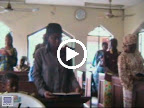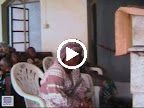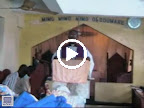 The transatlantic slave trade went on legally for over 300 years, half again as long as the United States has been a nation. Somewhere between 12 and 20 million of Africa’s strongest were shipped as slaves to South America, the Caribbean and the US. There were other long lasting slave trades: from East Africa to the Arab world and from Southeast Africa, India and as far away as Indonesia, to South Africa. We encountered this last when we visited the Slave Lodge in Cape Town where the enslaved peoples were imprisoned and forced to build that Dutch colony.
The transatlantic slave trade went on legally for over 300 years, half again as long as the United States has been a nation. Somewhere between 12 and 20 million of Africa’s strongest were shipped as slaves to South America, the Caribbean and the US. There were other long lasting slave trades: from East Africa to the Arab world and from Southeast Africa, India and as far away as Indonesia, to South Africa. We encountered this last when we visited the Slave Lodge in Cape Town where the enslaved peoples were imprisoned and forced to build that Dutch colony.But some of my ancestors survived the transatlantic slave trade and the most emotionally and spiritually important part of our pilgrimage for me was to confront that cruelty, that brutality, that failure of the human spirit. Goree Island, off the coast of modern Senegal, was one of the most important transit points in this trade in human life. It is quite possible that some of my ancestors passed through Goree before the Middle Passage to the US.
I think all four of us had been preparing ourselves for the visit to the island, not knowing what we would find or what our reactions would be. I thought I was ready to be in the place where so much violence had been done. We certainly found evidence of that violence preserved in the renovated Slave House, one of many on the island. The house was surprisingly small, perhaps the size of a middle class suburban home in the US. Upstairs had been the spacious quarters for the buyers, with a veranda looking out to sea and twin staircases leading down to the small courtyard, open to the sun. It was in this courtyard that the Africans were inspected like livestock before being purchased.
Surrounding the courtyard were the airless cells, most 8’X 10’, where dozens of Africans were held for up to three months. The 2 tiny cells, no more than three feet high, under the staircases where the “recalcitrant” slaves, those who resisted, were crammed, often packed so tight that it was difficult to close and lock the doors. The special cell for virgin girls, kept separate so that the buyers could have sex with them. Often the girls offered themselves willingly; if one conceived, she and her child were spared the Middle Passage and were allowed to live on Goree as free persons. The special cell where underweight Africans (less than about 140 lbs) were force fed black eyed peas to increase their weight so that they could be sold. The “renovation” of this house included removing some two feet of compacted human excrement from the floor of the cells.
And the “door of no return” through which the Africans were forced on ships for the Middle Passage. It was the only exit for them, either onto the ships or simply thrown into the sea if they became ill or resisted too much. During the slave trade the waters around the island were perpetually inhabited by sharks.
I had prepared myself to hear the story of the complicity of religion. The missionaries were the Europeans who received the captured Africans on the coast and held them for transit to Goree. The missionaries, among others, supplied the African tribes with guns and alcohol to encourage them to continue making war and taking the prisoners who were then enslaved. They traded one gun for one slave.
I had not, however, prepared myself for commercialism. Goree has become a tourist attraction. The ferry leaves the mainland on the hour, filled not only with pilgrim/tourists, but with shop keepers insistent on selling jewelry and trinkets. “What is your name? Come visit my shop.” It was hard to find a moments peace. At first, I resented their intrusion on my spiritual space. But then I realized that they were simply doing what they could to survive, no less than the Africans who were brought to the island in chains.
Nor had I prepared myself to imagine standing in the courtyard of that Slave House, cut off from my people, enslaved and being inspected for sale. I had not prepared myself to wonder whether I would have survived, nor for the raw anger that welled up. But, most, I was unprepared for the admiration I felt. Admiration for the courage, the strength, the perseverance of those who survived this violence and lived to father and mother a people in a distant land. Since that visit to Goree, I have felt so proud and so thankful for the gift of life and the legacy I have been given.
As we began our visit to Goree, the four pilgrims stopped at the church which had been built by the Dutch when they controlled the island and the salve trade. (At various times the Portuguese, the Dutch, the French, and the British controlled the island). Inside were images of the Black Madonna and a Black Jesus, obviously new additions. This was the church where the slavers went on Sunday to confess their sins, I wonder whether they even knew they needed forgiveness. Did their prayers even mention slavery? From the moment I saw it, I thought of the church as the Devil’s House.
As we sat in the cool interior, I found words of prayer.
Spirit of Life and of Love, Dear God,
We have come as pilgrims to this site of almost unbelievable brutality and violence. This place is a testament to the capacity for human cruelty. Sadly there are so many other places where that capacity has been unleashed. Our history as a species is replete with examples of our willingness to inflict suffering and death on other human beings.
We have come as pilgrims also to remember the incredible courage, strength and faith that allowed some who passed through this island to survive, to endure, to keep the spirit of life alive.
Both the capacity for brutality and the capacity for love exist in all of our hearts. A belief in our innocence is not an option. We must find a place that can know the reality of both.
As religious people, confronted by the reality of human cruelty, we are called to avoid despair. We are called, always, to search for the path which points toward compassion, respect and love. May we find the strength, the courage and the faith to match those who survived this place.
As Dr. King said, “Out of the mountain of despair, we will hue a stone of hope.”
Amen









